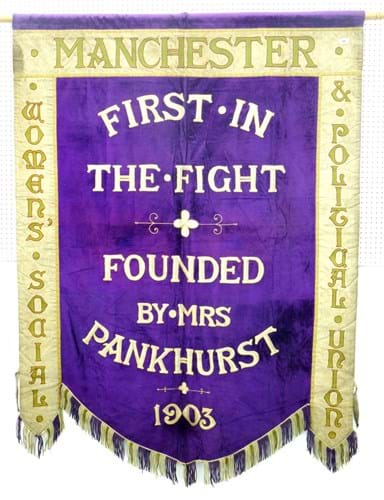It was in fact a very rare Suffragette banner which generated considerable interest when it was offered on June 20 by the Gary Don saleroom (which charges 21% buyer’ premium including VAT) also in Leeds.
On sale day bidding came down to a UK collector/dealer and a representative of the People’s History Museum in Manchester, both in the room, with the former emerging victorious.
Three of the edges of the banner are marked Manchester – Women’s Social & Political Union, and the centre in purple with First in the fight – Founded by Mrs Pankhurst – 1903.
While Suffragette jewellery is a common sight at auction, banners are rarely offered.
Manchester background
Liz Don from the auction house said: “It is just a small charity shop, an independent one that looks after elderly people in the local area. They told us it had been in a cupboard for 10 years. I don’t know whether they had a new manager in or something, but they were having a sort-out and came across it, and thought it might be worth a bit. We asked who it had come from, saying it was really important to find out who it belonged to.
“They said they used to look after an old man. When he died 10 years ago he left all the household contents to them because he had no other family. His mother had come from Manchester. If she wasn’t a member of the WSPU, she must have been a big supporter of the Suffragettes and this was her banner, or she had been left with it. She moved to Leeds in the 1930s and had a family and they lived there ever since. That’s all they could tell us, but that tied up with the fact it was a Manchester banner.”
Don said the charity had been given the mother’s supposed name, believed to be Edna White, and the saleroom started searching for any connection to the Manchester Suffragettes, but couldn’t find anything. The People's History Museum drew a blank too, but ‘Edna’ might just have been a supporter or a minor member.
The museum was also able to help with the manufacturer of the banner, noted on a label sewn on to the back as Thomas Brown. It confirmed Brown made banners in Manchester at that time.
Don admitted that although she was delighted for the Leeds charity (“they thought they might get £50 or something…”), she did feel disappointed for the lady from the museum who had travelled specially to the sale to bid.
Militant tendencies
“This banner is for the Suffragette group formed later on, the quite radical section that smashed windows, of which Emily Wilding Davison – who threw herself under the king’s racehorse at the Epsom Derby - was a member of,” added Don. “It was the militant side of it.”
In 1897, various local women’s suffrage societies formed the National Union of Women's Suffrage Societies, under the leadership of Millicent Fawcett.
According to a BBC history article, Emmeline Pankhurst, who had been a member of the Manchester suffragist group, “had grown impatient with the middle-class, respectable, gradualist tactics of the NUWSS. In 1903 she decided to break with the NUWSS and set up a separate society. This became known as the Women's Social and Political Union (WSPU)”.
“Mrs Pankhurst believed it would take an active organisation, with young working-class women, to draw attention to the cause. The motto of the Suffragettes was deeds not words and from 1912 onwards they became more militant and violent in their methods of campaign. Law-breaking, violence and hunger strikes all became part of this society's campaign tactics.”
Sister Sylvia
A month ago, Forum Auctions sold a book of poems by Emmeline Pankhurst’s sister, fellow Suffragette Sylvia, written while she was in prison.






